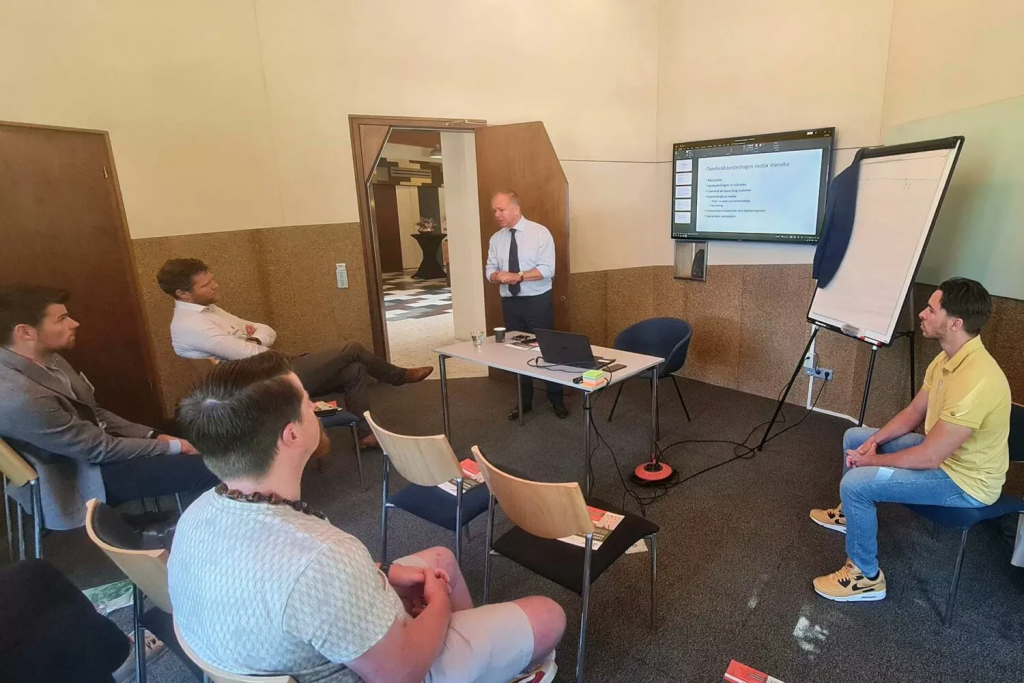
Public procurement can be an important instrument in driving social transitions. And that also applies to the circular biobased transition, in which the creation of new markets is crucial for the commercial breakthrough of biobased products.
“The insight that the government plays a role in this is still fairly new,” says Douwe-Frits Broens, Portfolio Manager Research at the Center of Expertise Biobased Economy (CoE BBE). Together with CoE BBE researcher & project leader Alexander Compeer, he gave a workshop on the National Procurement Database Biobased Products during the National Biobased Conference at the end of June. Suppliers can place their biobased products in this database for government purchasers.
Douwe-Frits referred to a bestseller by the American economist Mariana Mazzucato. She takes the iPhone as an example of a major innovation that would never have happened without government investment in technologies such as the Internet, GPS, the touchscreen and speech recognition software; all innovations developed with public money.
Orchestrate transitions
Government has the power to facilitate and orchestrate transitions. For example, by financing research programs of knowledge institutions, by providing subsidies to companies or consortia or by acting as the first buyer (‘launching customer’) of new products. “That is extremely important. The amount involved in government tenders is often many times greater than the amount that can be spent on subsidies,” says Douwe-Frits.
Procurement by the government is important for creating new markets and for giving companies in the entire chain the opportunity to gain experience. “A government can act as a co-maker even for products that are not yet fully developed. You notice that governments want to go in that direction, but the buyers are not trained for that. In the few purchasing courses that there are, the focus is mainly on negotiating, making a good price and limiting risks. The latter is not without reason: anyone who makes a small mistake in a tender nowadays has a lawyer on his roof.”
Different approach
In recent years, provincial and municipal administrators in particular have become increasingly enthusiastic about the introduction of sustainable, biobased or socially responsible procurement. “That requires a different approach from all parties involved. Because of the policy objectives, the purchaser must now suddenly not want to get the most out of purchasing and have an understanding of sustainability. And vice versa: the suppliers, SMEs, must learn to speak the language of the government and to use the right terms so that they do not talk past each other.”
Until now, there have been all kinds of initiatives to bring supply and demand together in the biobased field: so-called buyer groups of the expertise center PIANOo, regional networks, the National Environmental Database (NMD) to name a few. But they were all just not sufficiently focused on innovative SMEs. For example, the NMD should contain environmental data for all construction products and building installations. But to get that data, complex and expensive LCAs (life cycle analyses), tests and certificates are needed. “As a result, there are concrete and steel in the Environmental Database, but most innovative materials are not. The threshold is simply too high for start-ups and innovative SMEs. With the National Procurement Database for Biobased Products, we do offer these companies the opportunity to be found by buyers from the government.”
This is guaranteed by the fact that the purchasing database is an initiative of the provinces of Zeeland, Overijssel, Noord-Brabant and Noord-Holland. They want to use this to promote biobased government procurement. In this way, the provinces contribute to the climate goals, help their own purchasers to make the right choices efficiently and stimulate innovative entrepreneurship. “The only challenge then is to figure out exactly what information the buyers need to make a decision.”
Factual information
Alexander Compeer of CoE BBE demonstrated during the workshop how biobasedinkopen.nl works in practice. Every Dutch supplier of biobased products can store its data and products in it, but is responsible for the content itself. This does not mean that suppliers are free to cram their sales brochures and marketing materials into the database. It must indeed concern factual information that gives buyers the opportunity to assess and compare products, for example on the basis of the share of biobased carbon, the origin of raw materials (locally produced or not) and the degree of circularity. These terms are sometimes interpreted differently and that is why the definitions are explained in the database. The editorial board checks randomly whether the information in the database meets the quality requirements.
Want to participate, or first read more about the set-up and background of the National Purchase Database for Biobased Products? It can all be found on this website.
